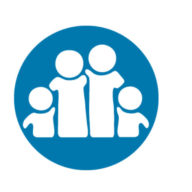Substance Abuse

What is a Substance Use Disorder?
*FSC is not a substance abuse treatment provider. Clients presenting with substance abuse as a primary presenting problem may be referred to substance abuse treatment provider.*
The DSMV describes substance use disorder as “a problematic pattern of use of an intoxicating substance leading to clinically significant impairment or distress.” Intoxicating substances include those that are and are not socially accepted, those that are and are not legally obtained, and those that may be prescribed by a physician.
According to the DSMV, you may experience a substance use disorder if two or more of the following apply within a 12 month period:
- You are using a substance in larger amounts or over longer periods than intended.
- You have unsuccessfully cut down or tried to control substance use, or have a persistent desire to cut down/control substance use.
- You are spending a lot of time in activities related to obtaining and using a substance, or recovering from its effects.
- You are having cravings (strong urges) to use a substance.
- You experience repeated problems at work, school, or home because of substance use.
- You experience persistent social or interpersonal problems related to substance use.
- You are missing important activities or have stopped doing activities because of substance use.
- You are using a substance in situations where its use is physically hazardous.
- You continue using a substance despite physical or psychological problems caused or exacerbated by its use.
- You have developed tolerance for a substance – you need more of the substance to get the desired effect.
- You experience withdrawal when not using a substance. Physical withdrawal symptoms range from mild headache to organ failure and death. Withdrawal from alcohol, benzodiazepines, and opioids can be fatal and medically assisted detox is highly recommended.
What Can A Substance Use Disorder Look Like?

In Crisis
Life threatening medical conditions resulting from and/or exacerbated by substance use
Job loss / school expulsion / legal problems / financial hardship resulting from substance use
Withdrawal symptoms that require medical attention
Engaging in risky behavior as a result of intoxication and/or to obtain an intoxicating substance.

Struggling
Serious health conditions resulting from and/or exacerbated by substance use
Job performance / academic performance / relationships are suffering as a result of substance use
Experiencing withdrawal when not using a substance
Being unable to successfully control your substance use
Loved ones expressing concern about your substance use

Surviving
Minor or minimal health problems resulting from and/or exacerbated by substance use
Job performance / academic performance / relationships are minimally impacted as a result of substance use
Substance tolerance has increased
Ways to Treat Substance Use:
There are many helpful treatments for substance use disorders and options for every level of care.
Evidence Based Treatment Options (Reaching out to a trained professional)
- Levels of care
- Early Intervention
- Outpatient
- Intensive Outpatient / Partial Hospitalization
- Residential / Inpatient
- Medically Managed Intensive Inpatient (medically assisted detox)
- Treatment Approaches https://www.naatp.org/addiction-treatment-resources/treatment-methods
- ACT
- CBT
- DBT
- Family Therapy
- Mindfulness Based Cognitive Therapy
- Motivational Interviewing (MI)
- 12-Step Facilitation Therapy
- Harm Reduction https://nida.nih.gov/research-topics/harm-reduction https://www.samhsa.gov/find-help/harm-reduction
- Medication-Assisted Treatment (MAT) – there are some medication options that have shown some benefit in treating substance use disorders.
If you or someone you know is in Crisis and unable to perform daily activities:
Symptoms may be or become overwhelming and prevent a person from engaging in many of the above interventions. People who are in crisis may require a more intensive treatment plan. When this is the case, call a professional as soon as possible. What happens next might include:
- Health and Safety Assessment (HSA)—people experiencing a crisis may benefit from a structured interview with a mental health clinician to assess the threats to their wellbeing and provide recommendations regarding seeking treatment.
- Partial Hospitalization Programs (PHPs)
- Intensive Outpatient Programs (IOPs)
If you or someone you know is in Danger of harm (Immediately call 9-1-1 or go to a crisis-trained organization)
• Emergency Room Hospitalization. Dial 9-1-1 or proceed to your nearest emergency room if you or someone you are with is in imminent danger of harm.

